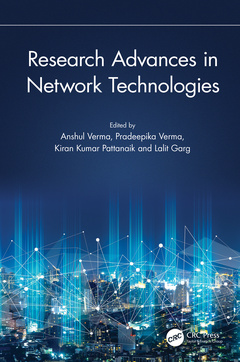Research Advances in Network Technologies
Coordonnateurs : Verma Anshul, Verma Pradeepika, Pattanaik Kiran Kumar, Garg Lalit

In current digital era, information is an important asset for our daily life as well as for small and large-scale businesses. The network technologies are the main enablers that connect the computing devices and resources together to collect, process and share vital information locally as well as globally. The network technologies provide efficient, flexible and seamless communication while maximizing productivity and resources for our day-to-day lives and business operations. For all its importance, this domain has evolved drastically, from the traditional wired networks to Bluetooth, infrared-waves, micro-waves, radio-waves and satellite networks. Nowadays, network technologies are not only restricted to computer laboratories, offices or homes; many other diverse areas have been witnessed where network technologies are being used based on the applications and needs, such as vehicular ad-hoc networks, underwater networks, and the Internet of Things.
Along with the hardware-based and physical network technologies, a lot of research has been carried out by researchers from academia and industry to develop emerging software-based network technologies, such as network software architectures, middleware, and protocol stacks. The software-based network technologies become the main driving force behind the paradigm shift in this domain and have invented many new network technologies such as grid computing, cloud computing, fog computing, edge computing, software defined networks, content centric networks and so on. On the other hand, a lot of efforts have been made in cellular network technologies to improve the user experience and as a consequence, emerging cellular network technologies like LTE, VoLTE and 5G have been invented. Due to its demand and importance in present and future scenarios, numerous efforts have been done in the networking domain by the researchers, a lot of work is still ongoing, and many more possibilities have yet to be explored. Therefore, there is a need to keep track of advancements related to the network technologies and further investigate several ongoing research challenges for the ease of users. With this goal in mind, Research Advances in Network Technologies presents the most recent and notable research on network technologies.
1. Energy and Delay Balance Ensemble Scheduling Algorithm for Wireless Sensor Networks. 2. An Improved RSSI Based WSN Localization Algorithm for Coal Mine Underground Miners. 3. YaraCapper - YARA Rule-Based Automated System to Detect and Alert Network Attacks. 4. Describing Nature Inspired Networking and Real-Time Task Execution: A Theoretical Study. 5. Memory Characterization of GPGPU Applications. 6. A Fuzzy Logic Based Emergency Vehicle Routing Technique for Vehicular Adhoc Networks. 7. A Fog Cluster based Framework for Personalized Healthcare Monitoring. 8. QTR: QoS-aware Traffic Rerouting in OpenFlow based Software Defined Networks. 9. Application-Based Evaluation of Neural Network Architectures for Edge Devices. 10. Effective Parallel Approach to Enhance the Performance of Cloth Simulation Model for Real-Time Applications. 11. Pruning in Recommender System using Learned Bloom Filter. 12. Performance Evaluation of ARIMA and CRNN for Weather Prediction. 13. A Novel Approach to Sorting Algorithm. 14. A New Proposed Sorting Algorithm using Radix Tree and Binning. 15. Grey Wolf Optimizer for Load Balancing in Cloud Computing. 16. A COVID-19 Vaccine Notifier Android App "CoWin Mitra". 17. Mathematical Modelling of Glucocerebrosidase Signalling Networks Linked to Neurodegeneration. 18. Empirical Analysis of Performance of Routing Protocols in Opportunistic Networks. 19. Reduce The Privacy & Security Concerns of Current Social Media Platforms Using Block-Chain Technology.
Dr. Anshul Verma received M.Tech. and Ph.D. degrees in Computer Science & Engineering from ABV-Indian Institute of Information Technology and Management Gwalior, India. He has done Post-doctorate from Indian Institute of Technology Kharagpur, India. Currently, he is serving as Assistant Professor in Department of Computer Science, Institute of Science, Banaras Hindu University Varanasi, India. He has also served as faculty member in Computer Science & Engineering Department at Motilal Nehru National Institute of Technology (MNNIT) Allahabad and National Institute of Technology (NIT) Jamshedpur, India. His research interests include IoT, Mobile ad-hoc networks, Distributed systems, Formal verification, and Mobile computing. He is serving as Editor of the Journal of Scientific Research of the Banaras Hindu University.
Dr. Pradeepika Verma received her Ph.D. degree in Computer Science & Engineering from Indian Institute of Technology (ISM) Dhanbad, India. She has received M.Tech in Computer Science & Engineering from Banasthali University, Rajasthan, India. Currently, she is working as Post-Doctoral Fellow in Department of Computer Science & Engineering at Indian Institute of Technology (BHU), Varanasi, India. She is also Associate Professor in Department of Computer Science at K L Deemed to be University, Andhra Pradesh, India and is presently on study leave. Prior to this, she has worked as Assistant Professor in Department of Computer Science & Engineering at Pranveer Singh Institute of Technology, Kanpur, India and as Faculty member in Department of Computer Application at Institute of Engineering and Technology, Lucknow, India. Her current research interests include IoT, Natural Language Processing, Optimization Approaches, and Information Retrieval.
Dr. Kiran Kumar Pattanaik holds Bachelor degree in Electrical & Electronics Engineering followed by Master and Doctorate
Date de parution : 03-2023
15.6x23.4 cm
Thèmes de Research Advances in Network Technologies :
Mots-clés :
network technologies; Wireless Sensor Networks; Vehicular Adhoc Networks; Under-water Networks; Internet of Things; cellular network technologies; LTE; VoLTE and 5G; LTE; WSNs; Timely Execution; Radix Sort; Convolutional Layer; Insertion Sort; Scheduling Algorithms; L1 Data Cache; IoT Device; Fog Computing; GWO; Sorted Array; RSSI Value; Vice Versa; Beacon Node; Genetic Algorithm; Routing Protocols; Microcontroller Systems; Real Time Scheduling Algorithms; ARIMA Model; Anchor Nodes; Backup Paths; Sensor Node; GWO Algorithm



